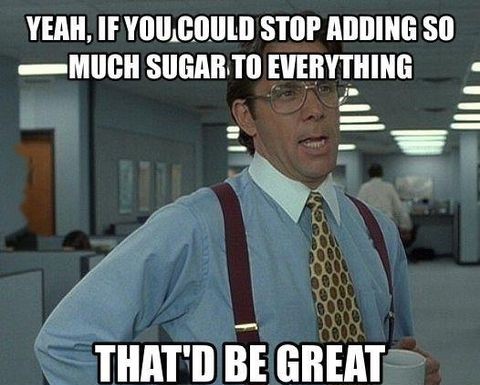Blog
Sorry, how much sugar?
We recently reached out to you all, asking for pictures of labels on food packaging you have found to be misleading regarding health claims and sugar content.
And what a response!
Thank you to all who contributed – you have been amazing!
Here are some examples of what was found:
Product: Tropicana Trop50 Orange fruit drink
Claim: 50% less sugar & calories than the leading orange juice.
Sugar content: 10g / 250ml serve
The concern: Firstly, what is the ‘leading orange juice’? And do fewer calories necessarily mean it is better for us?
The amount of sugar in a standard Tropicana OJ has been partly replaced in this healthified offering from PepsiCo by stevia and maltodextrin. Even so, 1 cup of Trop50 provides 2.5tsp of added sugar – over a third of the recommended limit (for health benefits).
The ingredient list includes added sweeteners and flavours, which seem at odds with the idea this product is better for you (and will help you “make friends with your miniskirt”). At least the premium Tropicana OJ is only orange juice!
Despite promoting itself as the healthier juice cousin you’d be better off eating an orange. At least an orange doesn’t need corn maltodextrin to make it palatable.
Product: Ocean Spray Reduced Sugar Craisins
Claim: 50% less sugar; Excellent fibre source; One serve of Reduced Sugar Craisins meets 50% of you daily recommended fruit needs.
Sugar content: 14g sugar/40g serve.
The concern: Okay – the added sugar content is less than regular Craisins, but 3.5 tsp are delivered in one serve, and artificial sweeteners have been added into the mix.
The fibre content has gone up…because a soluble fibre has been added to mix. It isn’t like the naturally occurring stuff from the fruit managed to explode in quantity.
Finally, to claim it is suitable as one of the two serves of fruit is dangerous. A fresh piece of fruit contains water, which leave you fuller and eating less fruit sugar overall. Additionally, fresh fruit does not contain added sugars. Not – I repeat – not a good alternative to a handful of berries or an apple.
Product: Pop Tops
Claim: 30% less sugar; No artificial sweeteners, No artificial colours, No artificial flavours.
Sugar content: 15.3g/250ml serve
The concern: Sure it may have less sugar than its old school sugared up formula, but this still packs an added sugar punch with nearly 4tsp per serve – the maximum of what we want our littlies to consume in a day. Not ideal considering our kids are most likely to be consuming such beverages.

Product: Uncle Tobies Roll Ups
Claim: No artificial colours or flavours; Made with real fruit, 3 Star health rating.
Sugar content: 2.8g/15.6.g serve.
The concern: The overall sugar content isn’t horrific. However, sugar has been added, but why considering the concentrated fruit paste rammed in? Fruit straps when made at home can be nothing but fruit.
Looking closely at the ingredient list, one of the final ingredients is ‘Vegetables and Plants’. I suppose that is meant to make us feel better!
Roll Ups also contain an array of highly processed wheat, corn and oil in amongst the sticky fruit mess, which is not ideal. And this stuff can get firmly wedged into the teeth wreaking all kinds of dental havoc!
Product: Nakd Crunch Mix wholefood bars
Claim: Protein packed; Filling and yummy; No added sugar; Wheat, gluten & dairy free; 100% natural ingredients.
Sugar content: 13.4g/30g bar
The concern: The sugar content from this product is mostly from the dried fruit such as dates and raisins, with a little added sugar from apple juice concentrate.
Whilst technically not an added sugar, fructose and glucose from dried fruits can easily be consumed in high amounts due to the lack of water content provided in the fresh fruit. Fortunately, this product does contain some healthy protein and fat from nuts, which can help mitigate the influx of simple sugar into the blood stream.
One bar provides 8-10% of recommended daily protein intake. I would think this is more fruit packed than protein packed.
Holy wow! Overall, I am bothered. Are you bothered?
Scientifically supported
Studies have found that the food industry can quite easily obscure the not-so-great elements of our pre-made foods with claims of being ‘healthy’ or ‘natural’.1 The consequence is we unknowingly over consume excess added, refined, nutritionally devoid foods and sugars.
How confusing! And kind of mean, don’t you think?
Always look beneath the surface
We believe we are doing the right thing, and place faith in the manufacturers. The reality is we need to educate ourselves, and dig only just below the surface to get a real indication of what we are shoving in our gobs.
Ultimately, as we always bang on about here at that sugar, if you can focus our purchasing and munching efforts on real whole fresh foods, then you are onto the best thing!
By Angela Johnson (BHSc Nut. Med.)
References:
- Bailin, D, Goldman, G, & Phartiyal, P 2014, ‘Sugar-coating Science’, Greentips, pp. 1-20.












